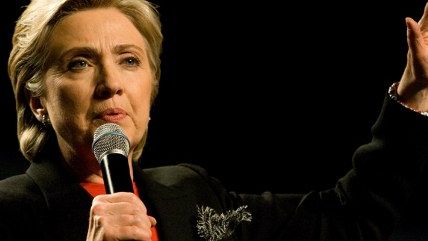The Failure to Stop Orlando Shooter Was Not a Surveillance Gap, So Reject Calls for More
We don't need a 'broader database.' And have we already forgotten about fusion centers?


As we learn more about the life of Orlando shooter Omar Mateen, what has become abundantly clear is that he was on a lot of people's radars, including the FBI's, for erratic behavior, threatening comments, and acting out.
There is and will continue to be a lot of backseat analysis of what authorities might have done (or should have been able to do) to have stopped this attack from happening. But what should be abundantly clear right now is that there was no surveillance gap here, no inability for the government to keep track of Mateen's behavior that needs to be addressed.
And yet, the response to Mateen's violence by some is for more lists, more surveillance, more government suspicion. Donald Trump gets lots of attention for fomenting anti-Muslim attitudes, but frankly Hillary Clinton is no better. She's on board with the idea of tying a person's right to gun ownership to mere suspicion of criminal activity, which is bad enough and thoroughly unconstitutional. But she also has made it clear that she wants to increase the likelihood people get placed on government surveillance lists. From NPR:
"We need to look carefully at this," she said. "Should we have a broader database? If someone comes to the attention of the FBI not once, but three times, that suggests that law enforcement needs to know, that people need to be more aware."
"If there had been a broader list that would have triggered the comprehensive background check required under Brady, that might have put a big red flag in the way of him purchasing the assault weapon plus the ammunition," she later added.
But all of this better communication people are calling for now is supposed to have been already happening with the new "fusion centers" created by the Department of Homeland Security that were designed to help police agencies share information about threats. Those fusion centers have been shown to be mostly worthless, money pits of superficial analysis that end up tracking mostly peaceful political movements within the United States rather than terror threats.
Our watch lists are already too "broad" as it is, consisting of hundreds of thousands of people with no direct ties to terrorism. Clinton's suggestion is to create more haystacks. As it is, intelligence agencies have warned that having too much data is itself a barrier to discerning actual threats. Does Clinton actually support the domestic surveillance of groups like Black Lives Matter? Because that's what has been happening with these calls for more snooping. That's where "broader lists" of people to be watched leads.
Whatever tools might have prevented the Orlando attack (even if such tools exist), the problem here was clearly not a lack of surveillance authority or a lack of useful intelligence.


Show Comments (40)